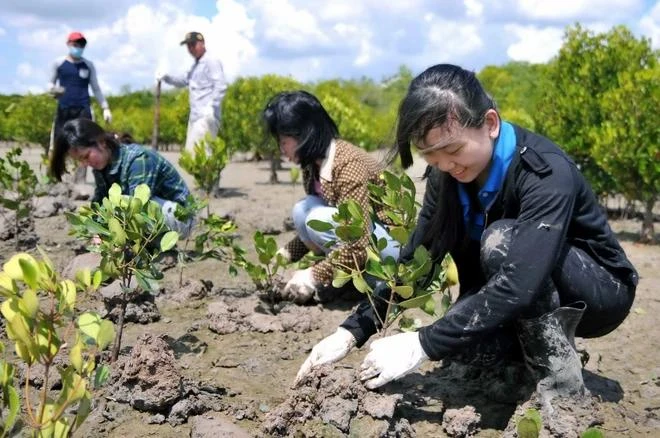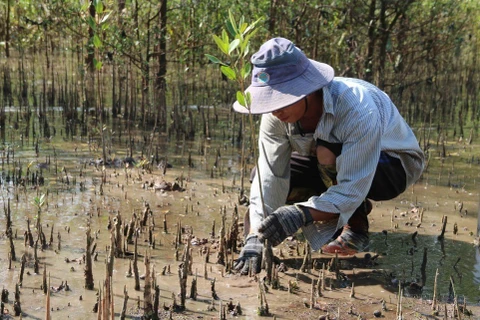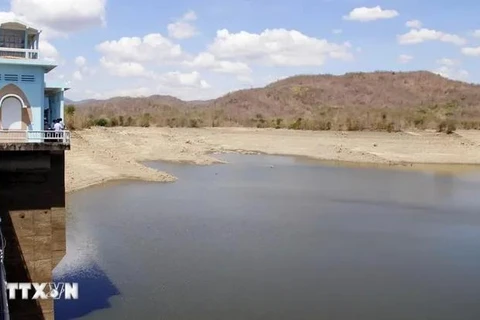
Hanoi (VNA) - Cutting-edge technologies like artificial intelligence (AI) and Blockchain are reshaping the fight against climate change, offering a pathway toward early climate analysis, enhanced carbon transparency, and mitigation of negative impacts, said experts.
They reached the consensus at the "Vietnam Climate Change Response Forum: Collaborating for Our Planet," held by the Saigon Innovation Hub in Ho Chi Minh City on June 5 in response to the World Environment Day.
Vietnam is one of the countries most affected by climate change, a problem of serious concern.
Dr. Tran Thanh Tam, from the Ho Chi Minh City University of Natural Resources and Environment, highlighted the myriad challenges posed by climate change. Temperature increases have caused a rise in sea water levels and saltwater intrusion from melting glaciers, droughts and floods caused by extreme weather events like El Nino and La Nina, and the risk of forest fires and coral reef loss.
To meet the 2050 Net Zero target, Vietnam has not only pledged but also devised specific strategies to reduce greenhouse gas emissions, placing emphasis on green technologies and innovative solutions.
Lynn Hoang, National Director of Binance, emphasised the pivotal role of technology in combating climate change. AI, she noted, aids data processing, accelerates calculations for accurate climate forecasts, and enhances industrial efficiency while reducing energy consumption. Meanwhile, Blockchain's transparent nature facilitates sustainable development by enabling efficient value distribution within decentralised networks.
Blockchain technology, specifically, can revolutionise carbon credit markets by establishing transparent, efficient trading platforms. Carbon credits can be easily traded on Blockchain platforms, fostering emissions reduction. Moreover, Blockchain enhances supply chain transparency, enabling consumers to verify sustainable production and transportation practices.
Le Yen Thanh, CEO of BusMap, highlighted Blockchain's potential in achieving Vietnam's Net Zero goals, citing BusMap's collaboration with VinBus to quantify carbon emissions from electric buses. Since 2020, BusMap has collaborated with VinBus to build a measurement and calculation system to convert the number of kilometers electric buses have travelled into approximately 37 million tonnes of carbon, equivalent to planting 1.5 million trees.
However, businesses do not know how to convert this into carbon credits that can be brought to the market to create value. The lack of clear quantification makes businesses unsure of the value their pursuits can bring.
Responding to this, Dr. Tam said that Vietnam currently has technical standards to calculate greenhouse gas emissions. Once there are specific measurement standards, businesses can rely on national quotas to build an appropriate emissions reduction roadmap. This is an important stage for technology and digital transformation to promote their role, helping businesses minimise greenhouse gas emissions.
Blockchains and AI will be key to promoting the development of carbon credits, Tam added.
From a macro perspective, Ha Trung Kien, CEO of Gapo, underscored technology's role in climate change adaptation, from AI and Big Data for accurate forecasting to IoT for resource optimisation in agriculture.
According to Kien, the fight against climate change cannot be separated from digital transformation. The application of technology helps to optimise processes, and minimise the use of resources that are not environmentally friendly. It also helps to reduce the use of materials that must be extracted from nature.
While technology offers promising solutions, Lynn Hoang cautioned against losing sight of immediate community challenges. She stressed the importance of addressing pressing issues like saltwater intrusion and drought in the Mekong Delta alongside broader discussions on carbon credits./.






















